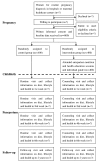Diet and lifestyle interventions in postpartum women in China: study design and rationale of a multicenter randomized controlled trial
- PMID: 20187965
- PMCID: PMC2837853
- DOI: 10.1186/1471-2458-10-103
Diet and lifestyle interventions in postpartum women in China: study design and rationale of a multicenter randomized controlled trial
Abstract
Background: "Doing the month", or "sitting month", is a traditional practice for postpartum women in China and other Asian countries, which includes some taboos against well-accepted healthy diet and lifestyles in general population. Previous studies have shown this practice may be associated with higher prevalence of postpartum problems. The current multicenter randomized controlled trial (RCT) aims to evaluate outcomes of diet and lifestyle interventions in Chinese postpartum women.
Methods/design: The current multicenter RCT will be conducted in three representative areas in China, Shandong province, Hubei province and Guangdong province, which locate in northern, central and southern parts of China, respectively. Women who attend routine pregnancy diagnosis in hospitals or maternal healthcare centers will be invited to take part in this study. At least 800 women who meet our eligibility criteria will be recruited and randomly assigned to the intervention group (n > = 400) and the control group (n > = 400). A three-dimension comprehensive intervention strategy, which incorporates intervention measures simultaneously to individual postpartum woman, their family members and community environment, will be utilized to maximize the effectiveness of intervention. Regular visiting and follow-up will be done in both group; nutrition and health-related measurements will be assessed both before and after the intervention.
Discussion: To our knowledge, this current study is the first and largest multicenter RCT which focus on the effectiveness of diet and lifestyle intervention on reducing the incidence rate of postpartum diseases and improving health status in postpartum women. We hypothesize that the intervention will reduce the incidence rates of postpartum diseases and improve nutrition and health status due to a balanced diet and reasonable lifestyle in comparison with the control condition. If so, the results of our study will provide especially important evidence for changes in both the concept and action of traditional postpartum practice in China.
Trial registration: ClinicalTrials.gov ID NCT01039051.
Figures
Similar articles
-
The effect of weight management interventions that include a diet component on weight-related outcomes in pregnant and postpartum women: a systematic review protocol.JBI Database System Rev Implement Rep. 2015 Jan;13(1):88-98. doi: 10.11124/jbisrir-2015-1812. JBI Database System Rev Implement Rep. 2015. PMID: 26447010
-
The effect of health and nutrition education intervention on women's postpartum beliefs and practices: a randomized controlled trial.BMC Public Health. 2009 Feb 1;9:45. doi: 10.1186/1471-2458-9-45. BMC Public Health. 2009. PMID: 19183504 Free PMC article. Clinical Trial.
-
Remote Lifestyle Intervention to Reduce Postpartum Weight Retention: Protocol for a Community-Engaged Hybrid Type I Effectiveness-Implementation Randomized Controlled Trial.JMIR Res Protoc. 2025 Jan 7;14:e62847. doi: 10.2196/62847. JMIR Res Protoc. 2025. PMID: 39773922 Free PMC article.
-
Offspring body size and metabolic profile - effects of lifestyle intervention in obese pregnant women.Dan Med J. 2014 Jul;61(7):B4893. Dan Med J. 2014. PMID: 25123127 Review.
-
Traditional beliefs and practices in pregnancy, childbirth and postpartum: A review of the evidence from Asian countries.Midwifery. 2018 Jan;56:158-170. doi: 10.1016/j.midw.2017.10.019. Epub 2017 Nov 11. Midwifery. 2018. PMID: 29132060 Review.
Cited by
-
How Do Social and Behavioral Change Interventions Respond to Social Norms to Improve Women's Diets in Low- and Middle-Income Countries? A Scoping Review.Curr Dev Nutr. 2024 May 11;8(6):103772. doi: 10.1016/j.cdnut.2024.103772. eCollection 2024 Jun. Curr Dev Nutr. 2024. PMID: 38948109 Free PMC article.
-
A Comparison of Practices During the Confinement Period among Chinese, Malay, and Indian Mothers in Singapore.Birth. 2016 Sep;43(3):247-54. doi: 10.1111/birt.12233. Epub 2016 Mar 27. Birth. 2016. PMID: 27018256 Free PMC article.
-
Diet or exercise, or both, for weight reduction in women after childbirth.Cochrane Database Syst Rev. 2013 Jul 23;2013(7):CD005627. doi: 10.1002/14651858.CD005627.pub3. Cochrane Database Syst Rev. 2013. PMID: 23881656 Free PMC article.
-
The Association between Traditional Chinese Dietary and Herbal Therapies and Uterine Involution in Postpartum Women.Evid Based Complement Alternat Med. 2011;2011:918291. doi: 10.1155/2011/918291. Epub 2011 Apr 12. Evid Based Complement Alternat Med. 2011. PMID: 21584195 Free PMC article.
-
The Association between Postpartum Practice and Chinese Postpartum Depression: Identification of a Postpartum Depression-Related Dietary Pattern.Nutrients. 2022 Feb 21;14(4):903. doi: 10.3390/nu14040903. Nutrients. 2022. PMID: 35215552 Free PMC article.
References
-
- WHO. Postpartum Care of the Mother and Newborn: a practical guide. Geneva: World Health Organization; 1998. - PubMed
-
- WHO. The world health report 2005: make every mother and child count. Geneva: World Health Organization; 2005. - PubMed
-
- WHO. Maternal Mortality in 2000: Estimates Developed by WHO, UNICEF, and UNFPA. Geneva: World Health Organization; 2003.
-
- WHO. Maternal Mortality in 2005: Estimates developed by WHO, UNICEF, UNFPA, and The World Bank. Geneva: World Health Organization; 2007.
Publication types
MeSH terms
Associated data
LinkOut - more resources
Full Text Sources
Medical
Molecular Biology Databases



